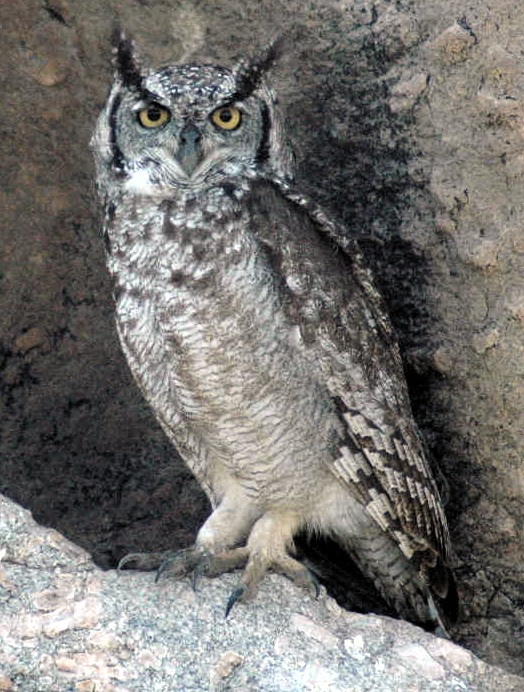ERROR : Server Busy(-1105)
ERROR : Server Busy(-1105)
Spotted Eagle-owl (Bubo africanus) - Wiki
Spotted Eagle-owl
From Wikipedia, the free encyclopedia
[Photo] Spotted Eagle-owl (Bubo africanus). Photo by David Erickson
Spotted Eagle Owl (Bubo africanus) is a species of the Horned owls. It is a medium sized owl and one of the smallest of the Eagle owls. Its height is forty-five cm (18 inch) and its weight is from 480 to 850g (1 to 1.8 pounds). They have a 33cm (13 in) wing span. The facial disk is off white to a pale ochre and the eyes are yellow. They have prominent ear tufts and the upper body is dusky brown with lower parts off white with brown bars. Prior to 1999 the Spotted Eagle owl was classed as a subspecies with the Vermiculated Eagle Owl but is now classed as a separate species. They are carnivorous and their prey consists of small mammals, birds, insects and reptiles.
Habitat
They inhabit most of Africa south of the Sahara desert away from dense forests. They are nocturnal hunters spending the day concealed in trees, rock ledges or abandoned burrows. They are found in areas with rocky outcroppings, scrub land open woods and semi deserts. Spotted eagle owls do not avoid populated areas. They will often hunt near roads and are often struck by vehicles. The major cause of death is pesticides used in agriculture for insect and rodent control.
Reproduction
Spotted eagle owls mate for life. They are able to breed at around one year of age. They make their nest on the ground and have been known to nest on window ledges of buildings. Breeding begins in July continuing to the first weeks February. The female lays two to four eggs and she does the incubation leaving the nest only to eat what the male has brought food. The incubation period lasts approximately thirty two days. The young owls can fly at around seven weeks of age. Five weeks later at twelve weeks the young owls leave the nest. They have a life span of up to ten years in the wild and up to twenty in captivity.
http://en.wikipedia.org/wiki/Spotted_Eagle-owl
| The text in this page is based on the copyrighted Wikipedia article shown in above URL. It is used under the GNU Free Documentation License. You may redistribute it, verbatim or modified, providing that you comply with the terms of the GFDL. |
|

